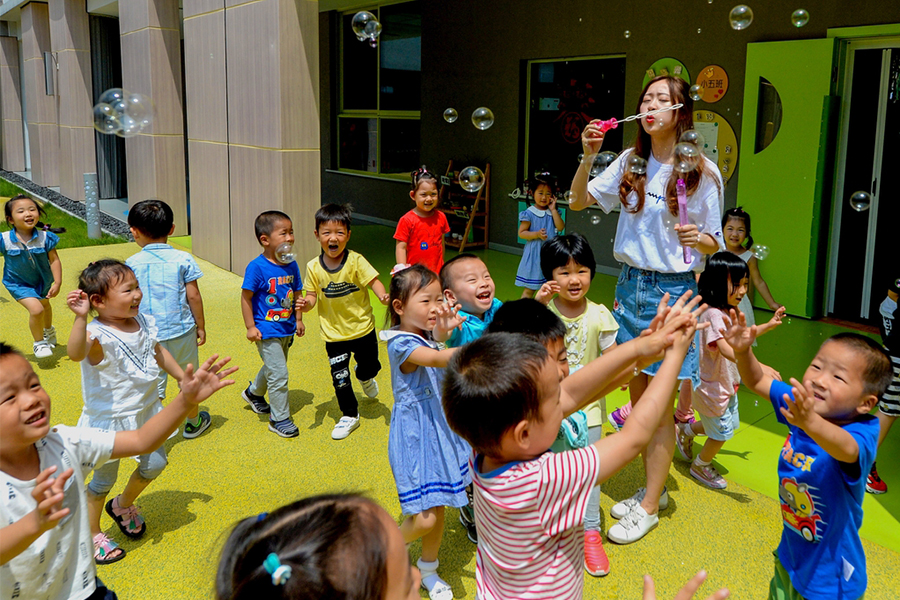Shanghai to offer care services for younger kids

Shanghai plans to extend child care services to younger children, aiming to establish a seamless continuum of care from infancy to pre-primary school within single institutions, according to a document released by the city government on Tuesday.
The city will require synchronized planning, construction and delivery of child care facilities alongside new residential compounds to help working parents balance career responsibilities and child care duties with greater confidence.
The initiatives were outlined in the document as part of efforts to improve early childhood care services and promote a more fertility-friendly environment. The measures align with national directives issued in October, which aim to address societal concerns and create a conducive environment for more young people to consider parenthood.
To provide inclusive and diverse child care services, the document also encourages industrial parks and employers to offer child care services for children under 3 years old at rates below market prices.
Shanghai has set a target for 85 percent of kindergartens, including government-run ones, to offer child care services for children under 3 by the end of 2025. The city also plans to further develop affordable child care services, enhance the quality of baobaowu — government-run playgrounds for toddlers in each subdistrict — and expand free caregiving services for families in need. Additionally, colleges and vocational schools will be encouraged to establish child care-related programs to nurture professional talent in the field.
Surveys conducted across China have identified the lack of child care support and challenges in accessing child care facilities for children under 3 as significant factors deterring young people from starting families. Economic pressures and the demands of child-rearing are also contributing to the issue.
China's fertility rate has been declining in recent years, dropping from 1.58 births per woman in 2017 to approximately 1 per woman in 2023. The year 2023 also marked the second consecutive year the country recorded negative population growth.
Shanghai has seen a sharp decline in births among its permanent residents, with 98,000 births recorded in 2023, compared to 218,400 in 2016.
To address these trends, the Shanghai document proposes implementing differentiated housing policies for families with two or more children and fostering fertility-friendly employment models. Eligible families with more than one child will be prioritized in the city's housing support system, allowing them to move up in the queue and choose larger apartments when applying for affordable housing.
Another focus is on addressing the accommodation needs of young adults and increasing the supply of affordable rental homes.
In December, Shanghai introduced a policy encouraging employers to create "parent-friendly job posts" with flexible working hours and arrangements to help employees balance work and family responsibilities. Sectors such as manufacturing, hospitality, food services, housekeeping and emerging industries in the digital, cultural and creative sectors are receiving support to pilot these initiatives.
Some parents believe more accessible child-related services in education and healthcare could alleviate people's fears about having children.
Zhao Jing, a 35-year-old mother of a 5-year-old girl in Shanghai's Changning district, noted that by the end of 2023, pediatric departments had opened in all 10 subdistrict community health service centers in the district. However, at the Xinhua Subdistrict Center, which is closest to her home, pediatric services are available only half a day per week.
"We hope such medical services can become more accessible, along with a wider variety of medicines suitable for children," said Zhao.
With the winter holiday approaching, some parents are also calling for more government-run child care facilities where working parents can send their children during school breaks.